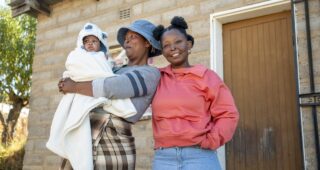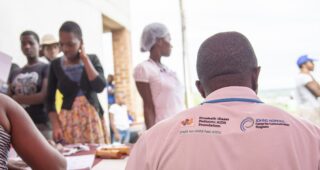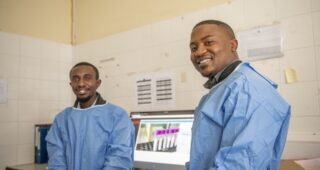Counselor on a Motorbike
You are here
Alice Tinga welcomes us into her tiny earthen home on the outskirts of a Maasai village near Aitong in Narok County, Kenya. Alice, 37, is one of the founding members of a peer support group for villagers living with HIV. We are soon joined by Stephen Koitumet, the HIV community facilitator who works with the local health center, who has arrived by motorbike.
Seated on molded plastic chairs inside the home are Mary Kijolo, 45, and a teenage mother breastfeeding her newborn. We enter and curious children take turns sidling by the entrance to peer at us and giggle.

We explain to the women that we have come to learn about their experiences living with HIV. The young mother excuses herself and hurries off. Later, Koitumet tells us that she has not yet disclosed her HIV status to her husband and is struggling with self-stigma.
Misinformation and stigma have been deadly concerns among the Maasai—especially when compounded by the custom of wife-sharing and the semi-nomadic lives of the herdsmen. HIV statistics have been understandably difficult to gather from this population, but in 2008 Kenya’s National AIDS Control Council estimated that 30 percent of Maasai were HIV-positive.
“It has really killed a lot of people, especially age 40 and above,” says Koitumet, who is, himself, Maasai.

“That is why you see the bomas (homesteads) empty—because the owners of the bomas are gone. They didn’t believe that HIV was there so they collected ‘medicine’ from the bush instead of seeking treatment at the health center. They believed that if someone is HIV-positive, the person must be cursed.”
Koitumet was assigned to the Aitong Health Center two years ago through the PAMOJA Project. He is a lifeline to the villages surrounding the Aitong Health Center, about 9,200 people.
“My work is to make sure that people come to me when they test positive [for HIV],” says Koitumet. “I open a file for them [and] I start to follow them. I make sure that they are getting drugs.” He says that if one of his clients fails to show up on schedule, after two days he will drive out on his motorbike to find them and deliver their drugs. Some clients live as far as 50 kilometers away.

“Sometimes we hold a meeting or we go to the barasa (community meeting called by the chief) and we tell [the villagers] about HIV. We tell them about the way you are supposed to live. We also go to the family members [of people living with HIV] and counsel them. We tell them about the advantages of taking drugs and using family planning.”
Alice is grateful for his support: “Before, I could only get HIV information and services at the health center. But they didn’t have much time for me.”


“When the community facilitators came down to the village, my life changed. Before, I was very poor in adherence. I could not keep appointments. I am doing fine now. I have more knowledge.”
Once a month, Alice and Mary join five other HIV-positive women under a tree for a peer support group, facilitated by Koitumet.
“When you go to the support group, you receive those teachings that really help you to adhere to drugs,” says Alice. “When I first went to the support group, I saw people who were not adhering; they looked sickly, and I pitied them … I felt bad for them.”
“But if you adhere to treatment you feel comfortable and you look healthy, and you continue doing your own things.”
“Now we see a change compared to six or seven years ago,” says Koitumet. “We are counseling families—creating awareness of HIV and the importance of taking antiretroviral drugs."

Eric Bond, EGPAF
Kenya
General



